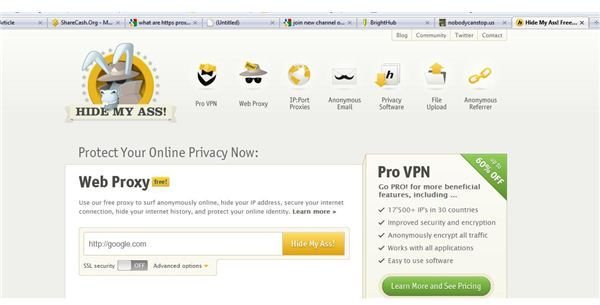How to Use HTTPS Proxy Sites for Fun and Profit
Yes, You Can Still Stick It to Big Brother!
A proxy server is a third-party server that you route your Internet connection through. Essentially, what HTTPS proxy sites do is hide your IP address. It is the proxy server’s IP address that shows up on the online records, not yours. Proxy servers are invaluable tools for anyone trapped in an oppressive environment, such as Internet-restrictive dictatorships, American high schools, or workplaces that block popular sites like Facebook. They are also useful for accessing web sites from which you have been banned.
Many privacy-conscious users will surf through proxies even when browsing on their own computers. Doing so adds an extra layer of protection against fraud. Surfing this way prevents websites from installing cookies or knowing your IP address, and it directs any spyware, viruses and assorted other malware onto the proxy. Don’t feel guilty. They are built with short lifespans in mind.
HTTPS undetectable proxy sites are hated by governments, school boards, parents and employers alike. They make a mockery out of most of the parental control features available today. For this reason, thousands of HTTPS proxy sites get ‘‘blacklisted’’ on a daily basis. Fortunately for the oppressed masses of the world, whether you are imprisoned by Big Brother at school or work, we libertarian programmers of the world make them faster than the man can break them.
Keeping Under the Radar (Or, How to Enjoy the Noble Side of Proxies)
There are two main types of proxies in use today, HTTPS and socks 4 or 5. HTTPS proxy sites will typically only work with webpages (hence the HTTPS moniker) while socks proxies can communicate with a wider range of software applications. If you are just trying to browse the web, HTTPS proxy sites will do the trick 99% of the time, although they are a little slower than socks proxies. Lists of public proxies are released every day, but, due to the public nature of the lists, they rarely work longer than a week. Private proxy lists are available, but are really only needed for commercial purposes.
There are dozens of free https proxy sites out there. These services help the public fight against the continual blacklisting of proxies as they constantly add new proxies into rotation, and remove those that no longer work. A single Google search will turn up hundreds of free proxies. My personal favorite, based on functionality, not the unfortunate choice of name, is the Hide My Ass! proxy service. This is optimal for browsing as it has a Firefox add-on available. With the add-on in place, you need not dial in the proxy’s URL every time you wish to browse anonymously. It puts a little yellow icon with a black H besides your search bar. Clicking it opens an address bar, and you can type in the website you wish to visit and you will soon be there anonymously! It would, of course, be very foolish to install this add-on on your work computer, as you may as well walk into your company’s IT department and scream out ‘‘I’ve been browsing forbidden websites on company time!’’ So only download toolbars and add-ons on your own computer.
Other Options and How to Avoid the Dark Side
To enjoy safe, anonymous browsing, if HMA is too strongly named for you (you may have kids in the house, after all), there are many other free online proxies such as nobodycanstop.us, freeproxysite.com, or proxy4free.com which will serve you just fine. One survival tip, if you plan on using them often in hostile environments like work or school, is to mix up which proxy sites you use. Web traffic is typically less strictly supervised by IT administrators than downloads and installations, but 50 visits a day to the same site for several months will raise the eyebrows of your company or school’s IT supervisor and the Chinese Thought Police alike.
However, not all proxy sites are benevolent. There have been examples of dishonest proxy webmasters who design their proxies to save any personal information, such as account passwords and credit card information. The way to minimize falling for a dishonest proxy is to read each one’s terms of service, so you know if they store any of your data or not, and search the web for any good or bad reviews. If you find a sob story about some poor hack who ended up $10,000 in debt for using his credit card through a proxy, then you know which one to stay away from!
More often than being straight-out identity thieves, some proxies are tied in with marketing companies, so by using them, they get an idea of your online habits and send you all kinds of spam offers. A careful reading of the terms of service will reveal if the proxy site operates this way.
So whether you want to evade your cruel oppressors or slack off at work or school, you will find HTTPS proxy sites a valuable ally in your activities!
References
- Author’s Knowlege
- Photo credit: Author Generated Screenshot
